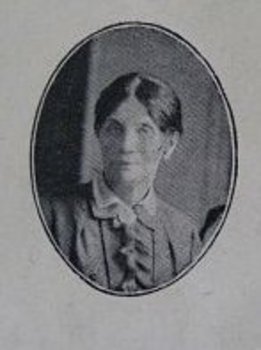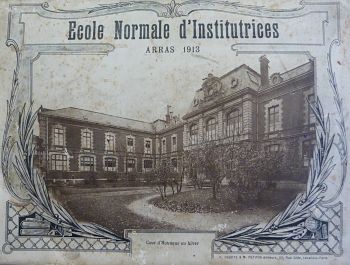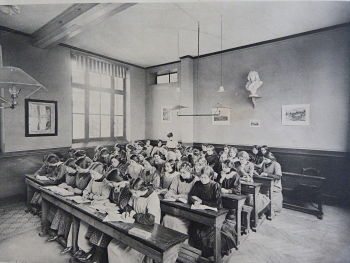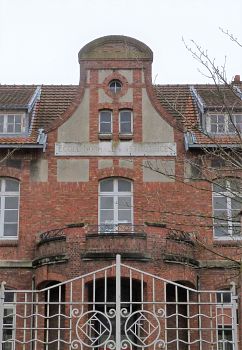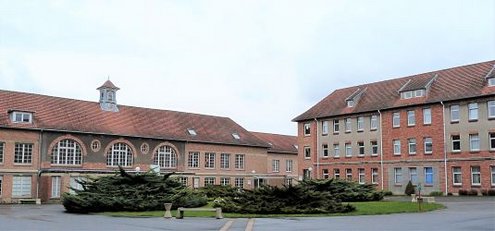
Youth and first steps in teaching
Juliette Félicité Marie was born in Trouville-sur-Mer (Calvados) on 6 October 1868. She was the daughter of Théophile Marie, a railroad letter carrier, and Madeleine Boussard, of no formal profession.We have little information about her youth and private life. She probably spent her childhood inNormandy[1]. She had at least one sister, Louise Joséphine, who was born in 1871and with whom she was very close, according toMs Leroy[2], a teacher at the Teacher Training College in Arras: ‘Miss Louise, who is twice your sister, sinceshe is both your sister and your best friend’[3]. She apparentlynever married[4].
His personnel file provides information about her career prior to her arrival in Arras. We learn that Juliette Marie had to travel in mainland France on several occasions for study and work purposes before being posted to Arras, sometimes to departments that were far apart (Calvados, Allier,Haute-Savoie, etc.)[5].
Her service record shows that she chose to become a schoolteacher in the 1880s, enrolling at Rouen TeacherTraining College[6]. She left this college[7] to attend the Teacher Training College in Fontenay-aux-Roses (now in the Hauts-de-Seine department)[8] and become a teacher at a teacher training college in 1888. In 1891, after obtaining her teaching certificate, she joined the Teacher Training College in Caen as a professor of literature. Three years later, in October 1894, she returned to Fontenay-aux-Roses to prepare to become the head of a teacher training college. She would remain there for one year. In the second half of 1895, she returned to her native region, taking up a post in an affiliated school of Rouen Girls’ Teacher Training College[9] before becoming a teacher at the Ecole primaire supérieure (EPS) in Le Havre in 1899. In 1901, Juliette Marie left Normandy to become the head of the EPS in Saint-Étienne, then, in 1903, of the École normale in Rumilly (Haute-Savoie). In September 1906, she left Haute-Savoie to become headmistress of the École normale d’institutrices in Moulins (Allier) until 1914. In February 1914, she moved to Pas-de-Calais to take charge of the Girls’ Teacher Training College in Arras, a position she held until her retirement in 1930. The job soon proved to be a trying one, with the arrival of war at the gates of Arras a few months later.
A headteacher amongst the turmoil of the First World War
August 1914, the First World War breaks out. Located in the Free Zone, just a few kilometres from the front throughout the war, Arras was soon surrounded by the German army. The town served as a rear base for Allied forces. In February 1916, Arras even became an English town with a bilingual administration. The proximity of the fighting did not spare Arras, which was targeted by German artillery as early as October 1914. The town hall and belfry collapsed in October 1914, and much of the town’s central districts were destroyed. The Pas-de-Calais teacher training colleges were also devastated by the war. A first-hand witness to these events, Juliette Marie recounted her first months of war as part of rector Georges Lyon’s 1920 academic inquiry. It’s the end of July 1914, and the students and staff of the Girls’ Teacher Training College are about to break up for the holidays when Juliette Marie receives orders to remain at her post. Over the following days, the school became a gathering place for several hundred mobilised men from the Pas-de-Calais department. They came to collect their equipment before joining the armies. The school was then requisitioned by the military health services and became a hospital. A few weeks later, on 1 September the first Germans appeared in the vicinity of the school, with 1,500 soldiers occupying the town. From late August to 10 September, Arras lived in almost complete isolation, with no communication with the rest of the country. Gradually, after the Battle of the Marne, relations with the rest of the country were re-established. Juliette Marie intended to organise the start of the school year on 1 October, even with a very small number of pupils, as some could not travel to Arras because they were based behind the front line.
But the sound of approaching cannonfire made her realise that war was just around the corner. On 5 October, Arras was surrounded by the enemy on three sides. On the night of 5-6 October, the city began to be bombarded, with shells falling near the school. The school was spared, but the neighbourhood was devastated. By 9 October, the neighbourhood was unrecognisable. The school was still standing, but Juliette Marie noticed a great deal of damage (broken windows, etc.). The fighting, and the destruction that came with it, was getting dangerously close.On 21 October, she noted with sadness the disappearance of Arras’ belfry. Throughout this period, she had to live with several people in the institution’s basements. Despite these conditions, Juliette Marie chose to remain at her post to look after her school.
After a few days of relative calm, on 25 October Juliette Marie received an order from the Prefect stating that she was released from all professional obligations and urging her to leave. She decided to go to the ENG (boys’ teacher training college) at the other side of town. The ENG, although located close to French batteries, was spared the fighting. However, the head, Léon Ancel, announced that he would be leaving the institution in three days’ time. At the beginning of November, taking refuge in the crypts of the former Ursuline convent assigned to the girls’ college, she learned that the right wing of the ENF had caught fire after being bombed by a German aeroplane. Arriving on the scene, she could only observe the extent of the damage, and made a point of searching for the accounting ledgers and a few items that had escaped the fire. Nothing was found in the rest of the school, which had been looted as soon as she left on 25 October. Later, the ruins and basements of the school became a refuge and rear base for Allied soldiers.
The Girls’ Teacher Training College in Arras disappeared, but the institution remained. Reading Juliette Marie’s testimony, we sense the desire to maintain training for teachers despite the war: ‘The enemy’s cannonfire may have destroyed our walls, but it has not destroyed our will to live, nor the hope that blossoms in our hearts that our beloved Arras Teacher Training College will soon arise from its ashes once again.
The rebirth of the Girls’ Teacher Training College from Arras to Berck-sur-Mer
At the end of 1914, Juliette Marie took refuge in central France, where she was employed as a temporary teacher at the boys’ secondary school in Saint-Étienne. However, she soon returned to Pas-de-Calais. In February 1915, the school inspectorate was in fact looking for premises to temporarily house the student teachers. The premises need to be large enough to accommodate classes and boarding. This search had been made complicated due to the fact that many buildings in towns in western Pas-de-Calais had been requisitioned by the Allies, as was also the case in Boulogne-sur-Mer and Montreuil-sur-Mer. Finally, premises were found in Berck-sur-Mer. The two relocated teacher training colleges opened their doors on 1 March 1915.
For Juliette Marie and her student teachers, it was a boarding house called ‘La Famille’, on rue de l’Hôpital, which was owned by an insurer, Henri Watissée. The school soon proved difficult to run, and the premises were too small to accommodate the pupils properly. At the Girls’ Teacher Training College, some of the student teachers could not be accommodated on site, so they were housed in two other buildings, the ‘Jeanne d’Arc’ and ‘Les Alcyons’ villas, and some lived with their families in Berck. These multiplepremises meant that the headteacher had to constantly move between the different buildings[10].
There was also a serious lack of equipment and furniture required for proper study. There was no library, no laboratory, no scientific equipment and no annexe school for the student teachers to practise in. They had to undertake their studies using whatever materials were available.In addition to poor study conditions, relations with the owners of the houses where the students lived and the owners of the restaurants where they ate were sometimes strained due to the work going on and alterations to the premises, problems with the lease, etc.
However, despite these difficult conditions, Juliette Marie managed to keep her school running smoothly, and studies gradually resumed as the war progressed, as people tried to make up for lost time. The war occupied the minds of the pupils, but they did not stop working hard, as the college’s inspector noted in June 1915: ‘Discipline didnot suffer as a result of the establishment’s imperfections’[11].
A long wait to return to Arras
On 11 November 1918, after several long years of war, the armistice was finally signed. But Juliette Marie and her pupils were unable to return to Arras immediately. Like the town of Arras, the college’s premises had been devastated and required extensive renovation work.
The decision was taken to build a new college building, and Juliette Marie kept a close eye on the construction process, studying the plans for the new college, visiting the construction site, choosing the furniture, etc. She left nothing to chance, as she wanted to provide students with a pleasant and comfortable environment in which to study. Designed for 200 students, the building was modern and met the standards in place in the 1920s: private rooms or cabins, a gymnasium, etc.
At theinauguration of the new school, she described the site as follows: ‘airy, light, spacious, and beautiful in appearance thanks to the harmony between proportions and colours’[12].
But thisreconstruction took a long time, and Juliette Marie and her pupils did not return to Arras until 1925[13]. Meanwhile, they remained at the Berck-sur-Mer premises. Working conditions continued to prove difficult, and the need to return to Arras becomes ever more pressing. As several of Juliette Marie’s letters testify, the premises were in urgent need of repair. For example, in 1921, a sewage pit overflowed into the courtyard used by the pupils, posing obvious hygiene problems. She also had to cope with post-war difficulties, such as shortages of manufactured goods and rising food prices.
In 1925, life at the Teacher Training College resumed its pre-war course in a reborn Arras. Juliette Marie saw to improving the appearance of the new school: planting trees, flowerbeds, decorating the classrooms, etc. A few years later, in 1930, Juliette Marie retired. She was honoured at a large sympathy ceremony held on 3 July. The event brought together current and former student teachers, teachers, the school inspector and the rector of the Lille education authority, Albert Châtelet. During the ceremony, her dedication and courage were highlighted by the various speakers.
A headteacher appreciated by all
Looking through the archives, we can see that Juliette Marie was fully committed to her duties and demonstrated great moral strength during her years at the helm of the Girls’ Teacher Training College in Arras. In April 1923, she was even awarded the Légion d’honneur for how she managed the college during the war. A few months earlier, to support the awarding of this honorary distinction, the school inspector recounted how Juliette Marie had made herself useful to the wounded in the hospital that had been set up at the school, and that she had gone to the college right away when it was set on fire. Similarly, theinspector recalled Juliette Marie’s mention in the Journal Officiel on 24 January 1915: ‘set up an ambulance in her school and when it was closed, bravely remained there on the front line’[14]. He also emphasised the fact that Juliette Marie stayed the course, managing to make the Teacher Training College in Berck-sur-Mer run as smoothly as possible. These qualities were recognised and reaffirmed in July 1930 by Ms Leroy, a teacher at the Teacher Training College, and by Albert Châtelet, the Rector of the education authority, who saw Juliette Marie as an example for her current and former student teachers: ‘In the small schools of the hamlets, in the overcrowded schools of the towns, when a poor isolated teacher has a moment of discouragement and doubt (...) she will see once again the headteacher’s benevolent face, she will think of the example set by Ms Marie, and with a smile, overcoming her fatigue and her sorrow, she will find her way back to the path you showed her, that of duty and goodness’. This was a sentiment shared by former students who saw her as a real source of moral support: ‘you were the soul of thehouse’[15].
At the same time, her qualities as an educator were unanimously recognised. This opinion was echoed in several inspection reports[16].In 1918, she was described as ‘hard-working’, ‘prudent’ and ‘much appreciated by the pupils’; in 1925, the inspector found her to be ‘very concerned about the material needs and educational convenience of the pupils’. She was seen as an outstanding headteacher who was concerned for the welfare of her student teachers, and as a fair, clear-sighted and kind-hearted person. She closely monitored her students’ studies and aimed to pass on to them an appreciation for work well done. She saw herself first and foremost as an educator, concerned with the well-being of her students.
This approach to her role was much appreciated by students and teachers alike, and she was a headteacher who left her mark, as recounted by a 3rd-year student on 3 July 1930: ‘Your “daughters”, you can be sure, will remain deeply attached to you, and the memory of the advice and example you have given them will guide their minds and hearts through life’. After leaving the Girls’ Teacher Training College, Juliette Marie left Arras and moved to the Paris region. She died in Saint-Germain-en-Laye on 31 January 1964.
Notes written by Adrien Flamme.
Notes
[1] We can assume this, as she completed her teacher training at Rouen Teacher Training College (see next paragraph).
[2] The first name of this person is unknown, but we can assume it was Célestine Leroy (1884-1966), a teacher at the Girls’ Teacher Training College in Arras from 1911 to 1944 and a specialist in local history and folk traditions in northern France.
[3] Source: see note no. 15.
[4] In the documents consulted, she is always referred to as ‘single’, and no marriage is mentioned on her birth certificate.
[5] We have little information on her professional career prior to her arrival at Arras Girls’ Teacher Training College due to a lack of sources and/or the geographical remoteness of the departments where Juliette Marie worked.
[6] The exact year of her arrival at Rouen Teacher Training College is unknown. It is likely that she started at Rouen Teacher Training College between 1883 and 1885. According to the decree of 29 July 1881, which set out the rules that applied to the teacher training colleges for several decades, students had to be at least 15 years old when they enrolled, and studies lasted 3 years.
[7] The acronyms ENF (école normale des filles) and ENG (école normale des garçons) will be used to designate teacher training colleges.
[8] The Third Republic founded the teacher training colleges in Fontenay-aux-Roses in 1880 (girls) and Saint-Cloud in 1882 (boys). They provided training for primary school inspectors and teachers and headteachers of teacher training colleges and upper primary schools
[9] Each teacher training college was required to have a primary school, which is where the students of the teacher training colleges would practise during their training.
[10] Rue de l’hôpital is now rue du Dr Victor Ménard. The premises of ‘La Famille’ no longer exist; they were located on the corner of what is now rue du Dr Victor Ménard and avenue Saint-Exupéry. The premises of the villa ‘les Alcyons’ still exist and are located at 16 rue du Dr Ménard (source: Berck-sur-Mer Municipal Archives).
The student teachers were housed on the first floor of three adjoining stores on avenue de la gare. The building still exists at the junction of today’s avenue du Général de Gaulle and rue des Lyons. Study conditions were also challenging (poorly ventilated rooms, lack of equipment, etc.).
[11] Quoted in the article by Johann-Günther Egginger, ‘Raconter et témoigner : la vie des élèves-maîtres et maîtresses des départements du Nord et du Pas-de-Calais pendant la Grande guerre... et après’ featured in the book La guerre des cartables 1914-1918 mentioned in the bibliography.
[12] Source: Department of Pas-de-Calais (quoted in the visitor’s guide to the former Girls’ Teacher Training College in Arras, produced by the department’s cultural service for the European Heritage Days).
[13] On the other hand, student teachers were able to return to study at the Arras premises from 1919 onwards.
[14] Source: Pas-de-Calais Department Archives (reference T1389/22, Juliette Marie file).
[15] A monograph was published following Juliette Marie’s retirement ceremony. It included testimonials from several speakers. It can be viewed at the Musée national de l’Éducation (National Education Museum) in Rouen (inventory no. 2006.06644) or in the Albert Châtelet collection of the Pas-de-Calais Department Archives (81 J 5).
[16] Source: Nord and Pas-de-Calais Department Archives (2T399 (AD59) and T1389/22 (AD62), Juliette Marie files)
Bibliography
Condette, Jean-François (dir.), La Guerre des cartables 1914-1918 : élèves, étudiants et enseignants dans la Grande guerre en Nord-Pas-de-Calais, Villeneuve d’Ascq : Presses universitaires du Septentrion, 2018.
Département du Pas-de-Calais (Mission restauration et valorisation des biens culturels), À la découverte du patrimoine départemental : École normale d’institutrices d’Arras, [Arras] : [Département du Pas-de-Calais], [années 2010] Guide produced for the European Heritage Days.
Sources
La Contemporaine
Arras (62): Les derniers jours de l’école normale d'institutrices, 1er août - 2 novembre 1914 (Juliette Marie’s account of the first months of the war, accessed at argonnaute.parisnanterre.fr/ark:/14707/a011435678431sqQere in June 2019)
Calvados Department Archives
Civil register of the commune of Trouville-sur-Mer for the years 1868 to 1871 (document accessed at archives.calvados.fr in September 2020)
Nord Department Archives
Personnel file of Juliette Félicité Marie - 2T399
Pas-de-Calais Department Archives
Installation in Berck (Pas-de-Calais, 1915-1921) - N1034
Personnel file of Juliette Félicité Marie - T1389/22
Teacher training college entrance exam (1914-1945) - T1638–165
Fonds de l’ancienne école normale d'institutrices d’Arras (Former Arras Teacher Training College Collection) - 3142W
National Museum of Education (Musée national de l’Éducation), Rouen
Inventory no. 2006.06644 Expression of sympathy on the occasion of the departure of Ms Marie (headteacher of Arras Teacher Training College) presided over by Mr Châtelet, Rector of the education authority, and Mr Sarthou, Pas-de-Calais school inspector [1930].

